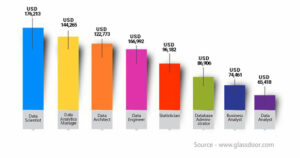Today, as organizations — big and small — grow their data assets, the need to distill valuable insights and business information from these treasure troves of data has become more important than ever.
This is the exact reason why a lot of businesses are now realizing that they need talented analytics professionals who have proven expertise in statistical approaches, scientific data segregation methods, analytics, and a plethora of other such data science methodologies.
According to one recent article published by the World Data Science Initiative, the data science market size is anticipated to grow from USD 95.9 billion in 2021 to USD 322.9 billion by 2026.

Although this increase in demand is good news for data science candidates in the present-day economic scenario, just as with every other field, an increase in demand also implies an increase in competition.
So then, what exactly does it take for you to stand out and land your ideal job?
Here’s a list of the seven most in demand data science skills that will help you do just that!
1) Statistical Analysis
As data science candidates, we all know that statistical concepts and techniques form an integral part of our jobs. Therefore, it should come as no surprise that statistical analysis is one of the most important skills hiring managers look for in potential recruits.
Being familiar with various elements of statistical analysis such as probability, distribution curves, standard deviation, variance, etc. helps place you in a better position than your counterparts.
Job interviews within the data science niche also revolve around testing your knowledge in these areas because that is how employers assess if you can effectively collect, organize, analyze, interpret, and present data to find useful results.
Due to all these reasons, statistical analysis is the #1 skill to have on your resume if you want to land your ideal data science role.
2) Knowledge of Linear Algebra and Multivariable Calculus
The next top skill to have when looking to bag a data science job is — knowledge of linear algebra and multivariable calculus.
Being able to apply mathematical concepts to understand and augment the the fitting functions that match a model to a data set is invaluable. If not done correctly, the model won’t be able to derive accurate predictions.
In addition to that, data science candidates should be versed in using dimensionality reduction to simplify complicated analysis problems involving high-dimensional data.
Algebra and calculus skills are a must in machine learning too — for example, to train an artificial neural network on large volumes of data.
3) Coding and Programming Expertise
When you’re a data science candidate, it’s a given that you have to know programming.
Now, you don’t need to be a code master or essentially have a degree in Computer Science, but it’s going to be expected of you to know the basics of writing code.
Another important reason for you to learn the basics of coding is that nearly 5% of all data science and data analytics jobs can be found in IT (information technology) and other related professional services, according to one recent report by Forbes.
If you want to land a good job with a good company, it is important that you learn at least a few commonly and widely used programming languages.
Google’s Kaggle Subsidiary, which runs an online data science community, conducted a survey in 2020 that found more than 80% of the respondents who identified themselves as working data scientists said they use Python.
Second on the list was SQL, with around 40% usage.
Some other languages that are in-demand for data science roles these days include C, C++, Java, R, and Julia.
4) Predictive Modeling
Job roles that revolve around predictive analytics, and the predictive mechanism in general, are in a lot of demand in various fields these days. Data science is no different!
This is especially true because being able to use data to model different outcomes and scenarios, and make predictions on the basis of commonly observed patterns, is a central part of most data science positions.
Because predictive analytics looks for patterns in existing or new data sets to forecast future behavior, events, and results, it can be applied to a number of use cases in different industries such as medical diagnoses, healthcare equipment maintenance, and customer analytics.
Due to all these reasons, predictive modeling is at #4 on our list of most in demand data science skills!
5) Machine Learning
While it is a known fact that data scientists don’t necessarily need to work with artificial intelligence (AI) technologies and applications, they’re being hired by a lot of companies to implement machine learning applications these days.
“Companies are now seeking people with diverse skill sets for their data science units, and there are many points of entry into the field,” said Zoi-Heleni Michalopoulou, chair of NJIT’s Department of Mathematical Sciences.
“In speaking with prospective employers, we found out that not only are they seeking advanced computing skills in our graduates, but other skill sets as well, such as those specifically in mathematics and knowledge of Machine learning algorithms, for example,” Michalopoulou continues.
Skills in deep learning, a more advanced method that uses neural networks to create complex analytical models, particularly help data scientists stand out. So does knowledge of different types of algorithms, including the following:
- decision trees
- random forests
- k-nearest neighbor
- logistic regression
- k-means clustering
- linear regression
6) Data Visualization
Next on our list of most in demand data science skills is — data visualization!
Being able to visualize data effectively when presenting analytics results, especially when working with sets of big data that are large and contain different data types, is another important data science skill to have on your resume if you want to attract top companies.
Data visualization, in the context of data science, essentially encompasses the ability to use data storytelling to highlight and define the insights generated in a way that they can be communicated to business executives and other important stakeholders in the company.
As a result, it is important for data science candidates to master the use of Tableau, D3.js or various other data visualization tools that are available to help with the process. They should also learn how to create different types of data visualizations: bar, line, and pie charts; bubble charts; histograms; scatter plots; heat maps; and more.
7) Data Wrangling and Preparation
Lastly, while most of the data preparation and wrangling tasks usually fall on data engineers, data science candidates can greatly benefit from being able to do basic data profiling, modeling, and cleansing tasks.
In fact, one recent report found that most data scientists spend only 20% of their time on actual data analysis and 80% of their time finding, cleaning, and reorganizing huge amounts of data.
To aid in those efforts, data scientists should be familiar with using common data warehouse and data lake environments, including both relational and NoSQL databases and big data platforms such as Apache Spark and Hadoop.
With that, we’ve reached the end of this article!
To learn more about how you can increase your chances of getting noticed by the best companies and land the role of your dreams, get in touch with us at BenchPoint today! We’ll be happy to guide you in your job search and help you build strong connections in the process of doing so.
